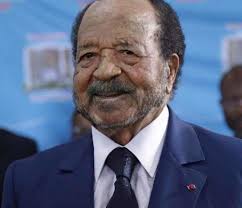PRESIDENT Paul Biya of Cameroon is dead.
The long-serving head of state who had ruled the central African country for 42 years reportedly gave up the ghost early this morning.
Born on 13 February 1933, Mr Biya served as the second president of Cameroon since 6 November 1982, having previously been the country’s prime minister from 1975 to 1982.
He is the second longest-ruling president in Africa, the longest consecutively serving current non-royal national leader in the world and the oldest head of state in the world.
The news comes after weeks of speculation about his health, following his extended absence from public life. Mr Biya’s death marks the end of an era for Cameroon, where he ruled for over four decades, shaping the nation’s political landscape with an iron grip.
He had recently attended the China-Africa Summit in early September 2024 but disappeared from the public eye soon after, sparking widespread rumours about his condition.
There were reports that he had been receiving treatment in Switzerland or was hospitalized in France, but no official statements were made at the time.
The absence of clear information on Biya’s health has led to growing concerns within the country about the future of its political leadership. Public figures, including prominent lawyer Christian Ntimbane, had openly called for transparency from the government regarding the president’s health.
“If he is on vacation, say so. If he is sick, say that too,” Ntimbane had urged, echoing the concerns of many Cameroonians. Paul Biya’s 42-year rule leaves a legacy of stability but also one marred by accusations of authoritarianism, human rights abuses, and suppression of political opposition. His tenure as president was marked by a strong centralization of power and a controversial approach to dissent, which his critics say stifled democracy in the country.
Mr Biya has indicated interest in retaining his plum position as the President of the Central African country even at 91 years old.
In August, Mr Biya reportedly indicated interest in the 2026 presidential election to seek an eighth term, by which time he would have been 93.
Founder of the Foreign Press Association Africa, Kennedy Wandera, on Thursday, 22 August 2024, citing TheEastAfrican, disclosed this.
The report read: “Cameroon is due to hold its next presidential election in 2025, longtime President Paul Biya will be 93. He has confirmed that he will contest.
“If he wins the election, and completes the new seven-year mandate, Biya will be 100 years old in 2032.”
According to the report, Biya’s decision to delay the election by a year (postponed from 2025 to 2026) and to allow him to contest despite his age has angered the opposition in Cameroon.
The report stated that opposition politicians may not be allowed to contest, leaving Biya free to win again and serve for 7 years.
Biya has served as the President for 42 years since 1982. He also served as the Prime Minister for 7 years from 1975 to 1982 before then.
He postponed the Parliamentary and Municipal elections until 2026.
“Cameroon’s parliament in July approved Biya’s request to postpone parliamentary and municipal elections until 2026 to allow some breathing space, claiming that the political calendar is crowded,” the report said.
Mr Biya, who had ascended to power following the resignation of Cameroon’s first president, Ahmadou Ahidjo, ruled the country with few challengers and consolidated control over the nation’s institutions. His death now raises questions about the future political landscape in Cameroon.
Political Succession
Mr Biya’s passing has ignited discussions about his succession, particularly given the recent speculations surrounding his eldest son, Franck Emmanuel Biya. Public rumours and social media chatter suggest that there may have been plans in motion to position Franck as his father’s successor, with critics decrying the potential for dynastic politics.
Cameroon Concord, a local publication, reported that Biya’s brother-in-law, Robert Nkili, could serve as interim president.
However, opposition figures, including Maurice Kamto of the Cameroon Renaissance Movement, are expected to challenge any non-democratic succession processes, calling for transparency and reforms.
The opposition leader had, in recent years, garnered significant support and challenged Biya’s legitimacy following the controversial 2018 presidential elections, in which Kamto claimed widespread fraud.
Biya was the world’s longest-serving non-royal leader and one of the oldest heads of state globally. His influence stretched beyond Cameroon, where he played a significant role in regional politics within the Economic and Monetary Community of Central Africa (CEMAC). Despite his long tenure, Biya remained a reclusive figure, rarely engaging with the media or the public.
His governance style has been described as highly centralized, with power concentrated within the presidency and a close-knit group of advisers.
As Cameroonians now look ahead, the nation faces a potentially turbulent political transition. While some argue that Biya’s stability-oriented governance helped preserve peace in the country, others believe it hindered democratic development. His death may open a new chapter in Cameroonian politics, with calls for reform expected to grow louder.
Eighteen-Eleven Media


